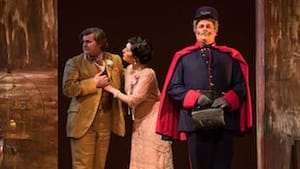Stay in the Loop
BSR publishes on a weekly schedule, with an email newsletter every Wednesday and Thursday morning. There’s no paywall, and subscribing is always free.
The triptych ends with a "Schi-quel"
OperaDelaware presents Puccini's 'Gianni Schicchi' and Michael Ching's 'Buoso's Ghost'

It’s comedy tonight! For the second evening of OperaDelaware’s 2018 Puccini Festival, the Wilmington, Delaware, company went on a wild romp that was worlds — and laughs — away from its opening-night verismo dramas. General director Brendan Cooks took the last act of Puccini’s Il Trittico — Gianni Schicchi, the composer’s only comedy — and cleverly paired it with Michael Ching’s contemporary sequel Buoso’s Ghost.
Schicchi opens with comic orchestra riffs as the frantically greedy Donati family has gathered at the deathbed of wealthy Florentine relative Buoso. This comically unsavory group attempts to outmaneuver one another to snag Buoso’s goods, and when he dies — yes, Puccini keeps Buoso’s hapless corpse onstage through the first half of the opera! — they discover he left everything to the church.
Determined to find a way to circumvent the will, the doltish self-servers can’t come to any solution. Buoso’s nephew Rinuccio (tenor Kirk Dougherty) suggests that only clever Gianni Schicchi (baritone Sean Anderson) can save them.
And how convenient is it that Schicchi is also the father of Rinuccio’s forbidden love, Lauretta (soprano Sara Duchovnay)? The Donati family scorns association with a self-made man who’s not even a Florentine. Their snobbery is outweighed by greed, however, and they agree to the scheme. When Schicchi undertakes to save the hypocritical family, he also plots their comeuppance and his own revenge.
Boffo comedy
In director A. Scott Parry’s boffo staging, each member of the spirited 15-person ensemble is a clear character with a strong backstory. Virtually never offstage and unified only in their hatred — of the friars, each other, the world in general — they wheel around in constant comic motion, trying to outdo one another.
When they sing in chorus, Puccini underscores their cross purposes by bringing them in ever so slightly behind one another, a musical device cleverly echoed by Parry. The ensemble work here calls for intricate, exacting singing, and the company achieves both, as well as generating an enormous amount of just plain fun.
Though Rinuccio has an aria fleetly sung by Dougherty, Puccini crafted one true showstopper here, the ubiquitous though ever lovely “O mio babbino caro.” It was a huge hit in Puccini’s day and continues — in film and TV commercials — to be one still. Duchovnay tempers any saccharine tendencies with a minxlike manipulation of her father, to whom she plaintively sings.
The star of this show is, of course, the wondrous Schicchi. As the foxy title character, Anderson employs every trick in any baritone’s book — musical or comic — with ease and delight. His Schicchi is full of himself and totally aware of his strengths and the weaknesses of those around him. The accomplished singer creates a clever character that never drops into caricature. This is a demanding role in many ways, including a bag of vocal tricks, and watching Anderson romp through the evening with seeming ease was one of the night’s great treats.

Extra credit
Conductor Michael Ching — leading a zippy, on-the-money orchestra — is also the composer and lyricist of his own frothy, oft-produced Buoso’s Ghost. This “Schi-quel” (as OperaDelaware dubbed it) opens the evening’s second half at the exact moment Schicchi ends.
Ching credits an insatiable curiosity about what happened to Schicchi and all the Donatis as the impetus for writing his popular work. In Buoso’s Ghost, the composer continues the nonstop action, inventively citing Puccini themes and various opera tropes. All the characters and company members are back in full and in force, still creating operatic mayhem.
Stephen Dobay’s set design that so perfectly served the drama of the first two Trittico works gets reconfigured and slightly skewed to comically flatten out the action. Aided by Tláloc López-Watermann’s straightforward lighting, the design reinforces the singers’ frenzy and brings them practically off the stage and into the audience.
Howard Tsvi Kaplan’s costumes offer a witty take on the show’s 1918 setting, the year Puccini wrote Schicchi but not the period in which he set it. Kaplan makes some clever sartorial comments, but the highlight is Schicchi’s red and blue Gilbert-and-Sullivan quasi-military train conductor’s uniform, replete with a useful cape Anderson wields effectively in a witty star entrance.
Puccini wrote for houses similar to the Grand, which was built in the late 1800s and constructed expressly for voice and orchestra. Because of its age and configuration, the hall doesn’t easily accommodate overzealous staging or complex tricks; OperaDelaware knows how to use it.
For this production (its third annual Spring Festival), Cooke and cohorts wisely emphasize fine singing, a polished orchestra, and lively staging. Together, these elements create a sense of fun that transfers over the Grand’s (long vanished) operatic footlights.
What, When, Where
Gianni Schicchi, Part III of Il Trittico by Giacomo Puccini and Giovacchino Forzano; Buoso’s Ghost, by Michael Ching. Michael Ching conducted, A. Scott Parry directed. May 5, 2018, at the Grand Opera House, Wilmington Delaware. 302-442-7807 or operade.org.
Sign up for our newsletter
All of the week's new articles, all in one place. Sign up for the free weekly BSR newsletters, and don't miss a conversation.

 Gail Obenreder
Gail Obenreder